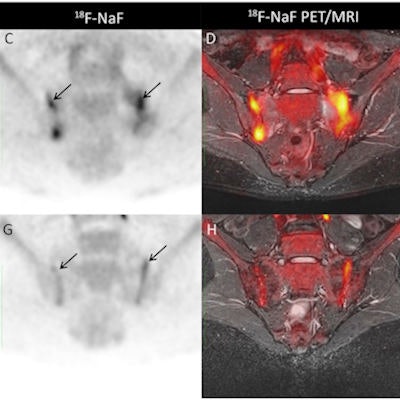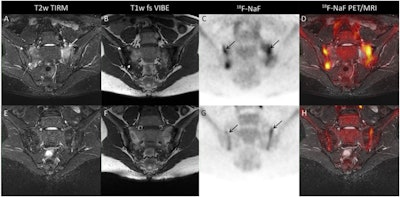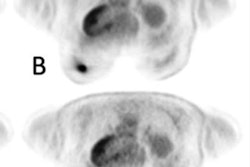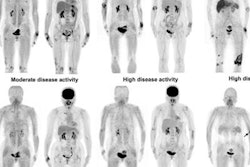
Hybrid PET/MRI shows promise in diagnosing and evaluating infection and inflammation, but most of the evidence came from anecdotal reports or small cohorts., according to a literature review published on November 8 in Seminars in Nuclear Medicine.
A team led by Dr. Martina Sollini, PhD, of Humanitas University in Milan found that PET/MRI appears to offer benefits such as an ability to image infection and inflammation and reduced radiation dose compared to PET/CT.
"PET/MRI technology demonstrated to be useful in infection and inflammation, being superior to each single modality and/or facilitating diagnosis in a number of conditions," the authors wrote.
 Atherosclerotic inflammation captured by F-18 FDG-PET/MRI. Image courtesy of Seminars in Nuclear Medicine.
Atherosclerotic inflammation captured by F-18 FDG-PET/MRI. Image courtesy of Seminars in Nuclear Medicine.PET technology has improved significantly in recent years, and hybrid PET/MRI scanners are now offering increased axial field of views that result in higher sensitivity. But more must be done to understand the technology's benefits. Sollini's team sought to do just that via a literature review that included 65 articles gleaned from PubMed from January 2018 to July 2022.
The review showed the following:
- Most PET/MRI studies (55 of 65) focused on inflammation.
- Cardiovascular diseases represented the most frequent field of interest (30 of 65).
- The team observed an increasing trend in bone and joint publications (12 of 65) over the course of the study's time frame.
- Other PET/MRI studies focused on neurology (11 of 65) and inflammatory bowel disease (eight of 65).
- F-18 FDG and gallium-68 DOTA-FAPI-04 were the most frequently used radiotracers for PET/MRI.
PET/MRI has some drawbacks that must be considered, the investigators noted, including high costs, current limited availability of the scanners, and challenges related to MR-based attenuation correction. But overall, the technology shows promise, according to the authors.
"Our review confirmed the capability of hybrid PET/MRI -- combining in a single modality the high soft tissue contrast, high resolution, and functional information of MRI, with molecular information provided by PET technology -- to positively impact on the management of infectious diseases and inflammatory conditions with expanding interest in a wide range of diagnostic indications," they concluded.





















